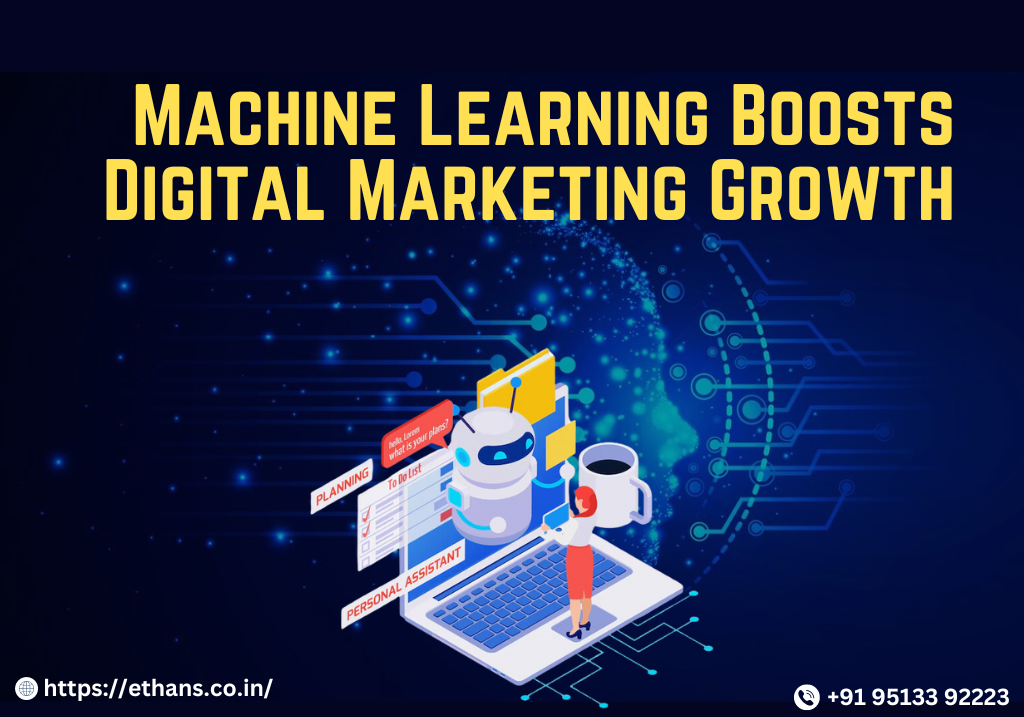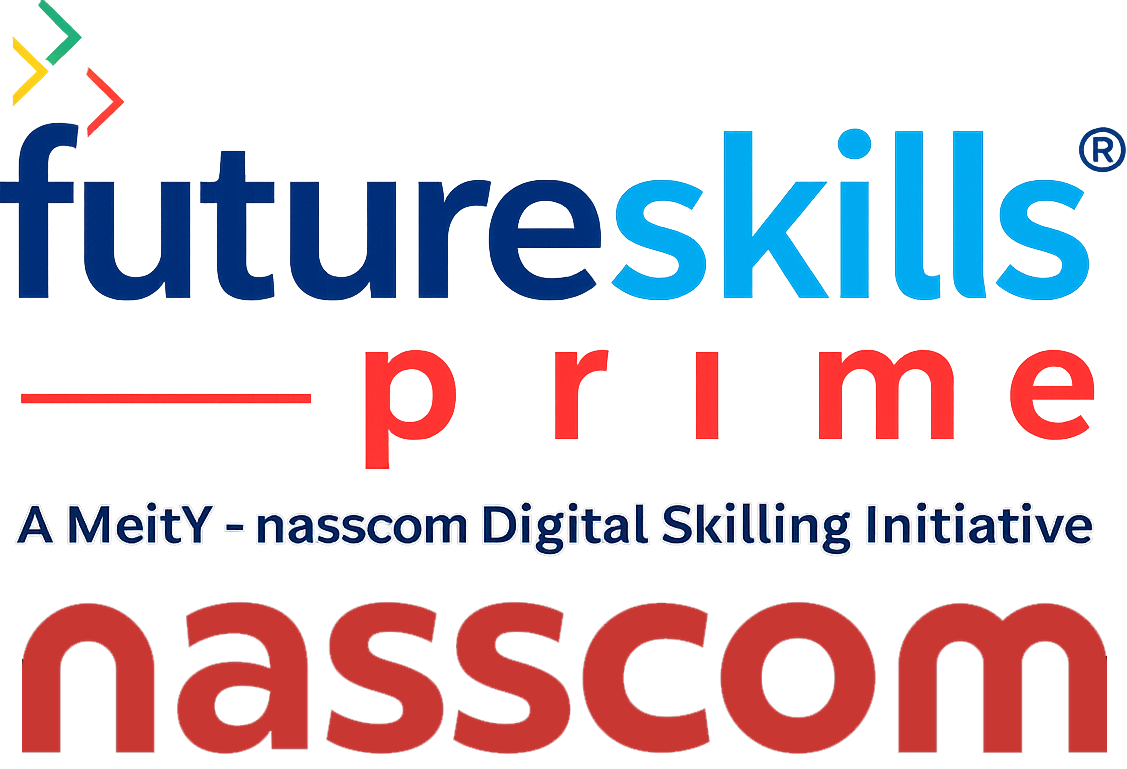Introduction to Machine Learning in Digital Marketing:-
In today’s rapidly evolving digital environment, businesses are continually exploring new avenues to connect with and captivate their intended audience. Amidst this quest for innovation, one approach gaining significant traction is the integration of machine learning techniques within marketing strategies. Specifically, machine learning is being leveraged to develop personalized advertising campaigns tailored to individual customers. This blog aims to delve into the significance, benefits, and The burgeoning importance of personalized advertising lies in its potential to enhance customer engagement and drive conversions. In an era characterized by information overload and short attention spans, generic, one-size-fits-all advertisements often fail to resonate with consumers. By utilizing machine learning algorithms, businesses can sift through vast amounts of data to gain insights into customer preferences, behaviors, and purchasing patterns. This wealth of information enables marketers to deliver advertisements that are not only relevant but also compelling and timely, thus increasing the likelihood of customer interaction and conversion.
The integration of machine learning in marketing represents a paradigm shift in how businesses engage with their target audience. By leveraging advanced algorithms and predictive analytics, marketers can deliver personalized advertisements that cut through the noise of the digital landscape and resonate with consumers on a profound level. However, this transformation is not without its challenges, including privacy concerns, algorithmic bias, and implementation complexities. Nevertheless, by embracing ethical practices, fostering transparency, and prioritizing the customer experience, businesses can harness the power of machine learning to create impactful and enduring connections with their audience. Elevate your expertise and stay ahead of the curve with Ethan’s Tech’s Machine Learning training programs in Pune designed to enhance your skills in this rapidly evolving field.
The Significance of Machine Learning in Marketing Growth
The significance of personalized advertising cannot be overstated, particularly in today’s digital landscape where businesses are constantly vying for consumer attention amidst a deluge of marketing messages. Here’s why personalized advertising, facilitated by machine learning algorithms, is increasingly vital:
-
Enhanced Customer Engagement:
Personalized advertisements have the unique ability to capture the attention of consumers by delivering content that speaks directly to their interests, needs, and preferences. Unlike generic ads that often feel intrusive or irrelevant, personalized ads are more likely to resonate with audiences, sparking genuine interest and fostering deeper engagement with the brand.
-
Increased Conversion Rates:
The ultimate goal of any marketing effort is to drive conversions, whether it’s making a purchase, signing up for a service, or taking a desired action. Personalized advertising has been shown to significantly boost conversion rates by presenting consumers with relevant products or offers at the right time and place. By leveraging machine learning algorithms to analyze customer data, businesses can identify patterns and trends that inform the creation of highly targeted ad campaigns, resulting in a higher likelihood of conversion.
-
Addressing Information Overload:
In today’s digital age, consumers are bombarded with an overwhelming amount of information and advertising messages on a daily basis. As a result, attention spans have dwindled, and consumers have become increasingly selective about the content they engage with. Generic, one-size-fits-all advertisements often get lost in the noise or simply ignored. Personalized advertising cuts through this clutter by delivering tailored messages that are more likely to capture and retain the consumer’s attention.
-
Insights-Driven Marketing:
Machine learning algorithms enable businesses to sift through vast amounts of customer data to gain valuable insights into consumer preferences, behaviors, and purchasing patterns. By leveraging this wealth of information, marketers can develop a deeper understanding of their target audience and tailor their advertising strategies accordingly. From segmenting audiences to predicting future trends, personalized advertising powered by machine learning allows businesses to make more informed decisions and stay ahead of the competition.
-
Timeliness and Relevance:
One of the key advantages of personalized advertising is its ability to deliver content that is not only relevant but also timely. By analyzing real-time data on consumer behavior and preferences, machine learning algorithms can ensure that ads are served to the right audience, at the right time, and on the right channel. This timely and relevant approach increases the likelihood of customer interaction and conversion, as consumers are more likely to respond positively to messages that align with their current needs and interests.
Personalized advertising fueled by machine learning algorithms is essential for businesses looking to cut through the noise of today’s digital landscape and connect with x`their target audience in meaningful ways. By delivering relevant, timely, and engaging content, personalized ads have the potential to drive higher levels of customer engagement, increase conversion rates, and ultimately, drive business growth.
Key Features of Machine Learning in Digital Marketing
Machine learning is a subset of artificial intelligence (AI) that focuses on the development of algorithms and models that enable the market to grow more and learn to make predictions or decisions based on demand and market standard. The Key Features of Machine Learning in Marketing:
- Personalization: Machine learning enables marketers to personalize customer experiences by analyzing vast amounts of data to understand individual preferences and behavior patterns.
- Predictive Analytics: Machine learning algorithms can predict future trends, customer behavior, and outcomes based on historical data, helping marketers make informed decisions and optimize campaigns.
- Automation: Machine learning automates repetitive tasks such as email marketing, ad targeting, and content optimization, freeing up marketers’ time to focus on strategy and creativity.
- Real-time Insights: Machine learning algorithms process data in real-time, providing marketers with immediate insights into campaign performance, customer interactions, and market trends.
- Segmentation: Machine learning algorithms segment customers into distinct groups based on similarities in demographics, behavior, or preferences, allowing marketers to target specific audience segments with tailored messaging.
- Optimization: Machine learning continuously optimizes marketing campaigns by testing different variables, such as ad creatives, messaging, and targeting parameters, to maximize performance and ROI.
- Fraud Detection: Machine learning algorithms detect fraudulent activities such as click fraud, fake accounts, and payment fraud, helping marketers maintain the integrity of their campaigns and budgets.
- Customer Lifetime Value (CLV) Prediction: Machine learning predicts the lifetime value of customers by analyzing their past behavior, purchase history, and interactions with the brand, enabling marketers to prioritize high-value customers and personalize their marketing efforts accordingly.
- Sentiment Analysis: Machine learning analyzes customer sentiment and feedback from various sources, such as social media, reviews, and surveys, to understand brand perception and identify opportunities for improvement or intervention.
- Cross-channel Integration: Machine learning facilitates seamless integration across multiple marketing channels, enabling marketers to orchestrate cohesive, omnichannel campaigns and deliver consistent messaging and experiences across touchpoints.
Machine learning boosts Digital Marketing:
Machine learning has revolutionized marketing in several ways, leveraging data-driven insights and automation to enhance targeting, personalization, and overall campaign effectiveness. Here’s how machine learning boosts marketing:
-
Data Analysis and Customer Segmentation:
Machine learning algorithms can analyze large volumes of customer data, including demographics, behavior, and preferences, to segment customers effectively. By understanding different customer segments, marketers can tailor their messaging and offers to specific audiences, improving engagement and conversion rates.
-
Predictive Analytics:
Machine learning enables predictive modeling, allowing marketers to forecast future trends, customer behavior, and campaign performance. Predictive analytics can help identify potential high-value customers, anticipate churn, and optimize marketing strategies accordingly.
-
Personalized Recommendations:
Machine learning algorithms power recommendation engines that suggest products or content based on individual customer preferences and browsing history. By delivering personalized recommendations, marketers can enhance the customer experience, increase engagement, and drive sales.
-
Dynamic Pricing:
Machine learning algorithms can analyze market trends, competitor pricing, and customer demand to optimize pricing strategies in real-time. Dynamic pricing enables marketers to adjust prices dynamically based on various factors, maximizing revenue and profitability.
-
Sentiment Analysis:
Machine learning techniques such as natural language processing (NLP) can analyze customer sentiment by mining social media, reviews, and feedback. Sentiment analysis helps marketers understand how customers perceive their brand, products, or services, allowing them to address issues proactively and capitalize on positive sentiment.
-
Optimized Ad Targeting:
Machine learning algorithms optimize ad targeting by analyzing user behavior, demographics, and contextual data to deliver relevant ads to the right audience at the right time. By targeting ads more effectively, marketers can improve ad performance and ROI.
-
Marketing Automation:
Machine learning-powered marketing automation platforms streamline repetitive tasks such as email marketing, lead scoring, and campaign management. Automation frees up marketers’ time, allowing them to focus on high-value activities such as strategy development and creative ideation.
-
Fraud Detection and Prevention:
Machine learning algorithms can detect fraudulent activities such as payment fraud, account takeover, and click fraud by analyzing patterns and anomalies in data. By identifying and mitigating fraud risks, marketers can protect their brand reputation and financial assets.
-
Customer Lifetime Value Prediction
Customer Lifetime Value Prediction through machine learning involves using algorithms to forecast the future value of customers based on their past interactions and behaviors with a brand. This enables businesses to prioritize marketing efforts and tailor strategies to maximize the value of each customer over their lifetime relationship with the company.
Challenges while using Machine Learning in Digital Marketing:
The integration of machine learning in digital marketing represents a paradigm shift in how businesses engage with their target audience. By leveraging advanced algorithms and predictive analytics, marketers can deliver personalized advertisements that cut through the noise of the digital landscape and resonate with consumers on a profound level. However, this transformation is not without its challenges, including privacy concerns, algorithmic bias, and implementation complexities. Nevertheless, by embracing ethical practices, fostering transparency, and prioritizing the customer experience, businesses can harness the power of machine learning to create impactful and enduring connections with their audience. Here are few challenges:
-
Data Privacy Concerns:
The collection and utilization of personal data for targeted advertising raise significant privacy concerns among consumers. Marketers must navigate regulatory frameworks and industry standards to ensure compliance with data protection laws and uphold consumer trust.
-
Algorithm Bias:
Machine learning algorithms are susceptible to bias, reflecting and amplifying existing societal prejudices present in the training data. Biased algorithms may inadvertently discriminate against certain demographic groups or perpetuate stereotypes, leading to ethical and reputational risks for businesses.
-
Implementation Complexity:
Integrating machine learning capabilities into existing marketing infrastructure requires specialized expertise and resources. Marketers must possess a deep understanding of data science principles, algorithm development, and model deployment to leverage machine learning effectively.
-
Over-reliance on Technology:
While machine learning algorithms excel at processing large volumes of data and identifying patterns, they may lack the human intuition and creativity necessary for crafting emotionally resonant advertisements. Marketers must strike a balance between automated decision-making and human-centric storytelling to achieve optimal results.
-
Ad Fatigue:
Excessive personalization or retargeting efforts can lead to consumer fatigue and resentment. Overexposure to personalized ads may result in ad blindness or even backlash from customers, diminishing brand perception and eroding trust.
Conclusion:
In conclusion, the integration of machine learning in digital marketing has revolutionized the way personalized ads are crafted for customers, offering a multitude of benefits that drive engagement, conversions, and ultimately, business growth. Let’s summarize the key points:
- Enhanced Relevance:
Machine learning algorithms analyze vast amounts of customer data to gain insights into individual preferences, behaviors, and purchasing patterns. By leveraging this wealth of information, marketers can create personalized ads that resonate with customers on a deeper level, increasing relevance and capturing their attention.
- Improved Targeting:
Machine learning enables marketers to segment their audience into distinct groups based on common characteristics or behaviors. This segmentation allows for more targeted and relevant advertising campaigns tailored to specific customer segments, leading to higher engagement and conversion rates.
- Predictive Analytics:
Machine learning models can predict future customer behavior and preferences based on historical data. By forecasting customer needs and preferences, marketers can anticipate demand, optimize inventory management, and tailor advertising messages to align with predicted trends, ensuring timely and relevant ad delivery.
- Dynamic Optimization:
Machine learning algorithms enable marketers to dynamically optimize ad content and messaging in real-time based on user interactions and feedback. By testing different variations of ad creatives and messages, marketers can identify the most effective strategies for engaging customers and driving conversions, maximizing the impact of their ad campaigns.
- Cross-Channel Integration:
Machine learning empowers marketers to deliver consistent and cohesive advertising experiences across multiple channels and platforms. By integrating data from various sources, marketers can create a unified view of the customer journey and deliver personalized ads at every touchpoint, enhancing the overall customer experience and increasing brand loyalty.
- Real-time Optimization:
Machine learning algorithms continuously analyze ad performance metrics in real-time and make adjustments to ad campaigns to optimize performance. This real-time optimization ensures that ads are served to the right audience, at the right time, and on the right channel, maximizing engagement and conversion rates.
In essence, Machine Learning in digital marketing enables businesses to craft personalized ads that resonate with customers on an individual level, driving higher engagement, increased conversion rates, and ultimately, improved return on investment (ROI) for marketing campaigns. By leveraging advanced algorithms and data analytics techniques, marketers can create compelling and effective advertising experiences that foster deeper connections with customers and drive long-term business success.





